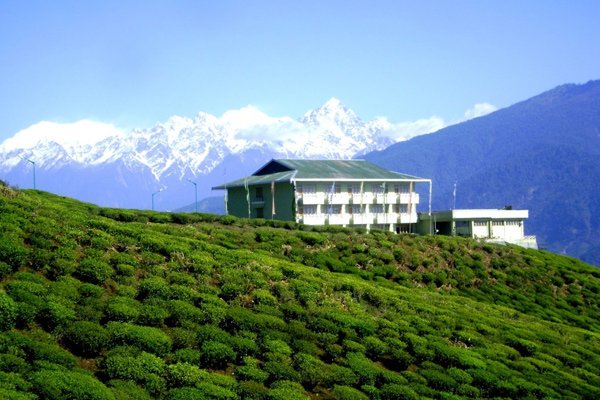
Work begins at sole tea garden in Sikkim
 Rajiv Ravidas, TT, 9 April 2020, Gangtok: Even as tea estates in neighbouring north Bengal continue to remain closed because of the coronavirus-induced countrywide lockdown, Sikkim's lone tea garden at Temi in South Sikkim started functioning from April 1 and is now harvesting the first flush, the most expensive batch of the brew.now harvesting the first flush, the most expensive batch of the brew.
Rajiv Ravidas, TT, 9 April 2020, Gangtok: Even as tea estates in neighbouring north Bengal continue to remain closed because of the coronavirus-induced countrywide lockdown, Sikkim's lone tea garden at Temi in South Sikkim started functioning from April 1 and is now harvesting the first flush, the most expensive batch of the brew.now harvesting the first flush, the most expensive batch of the brew.
The state government-owned Temi estate had remained shut for the first week of the lockdown that had begun on March 24 midnight and reopened after stringent safety measures had been put in place to protect the garden's 400-odd workers from Covid-19.
The garden had reopened a couple of days before the Union government granted explicit exemption to the tea gardens from the ambit of the lockdown on April 3, though with a rider that only half of the workforce should be engaged in order to maintain social distancing.
The Sikkim government's decision to reopen the Temi garden earlier, however, was based on the initial guidelines issued by the Centre on March 24 wherein along with manufacturing units of essential commodities, production units that require continuous process were also granted exemption from the lockdown after obtaining the required permission of the state government concerned.
"Tea is a continuous manufacturing industry. The guidelines also say it is for the state govermnent to take a call on it. Therefore, under a valid clause our state took that decision (to reopen the garden)," Mrinalini Shrivastava, the managing director of Temi Tea, told The Telegraph.
Shrivastava said the seven-day lockdown period was used to clean up the garden, carry out awareness programme among the workers and disinfect their houses. "We could not disinfect the garden because we are an organic plantation. We also have kept three Asha (trained female community health activist) nurses in the dispensary. We did all of these and then started operation from April 1 under stringent safety protocol," she said.
The safe measures also include providing hand sanitizers and masks to the workers and strict maintenance of social distancing norms both in the plantation and the factory.
"The workers are also being given incentives. The government has mentioned over and above their daily wage a similar anount will be given. Rs 300 is the daily wage, so another Rs 300 will be paid to them as incentive for the lock-down period," she said.
The safety measures that have been put in place and the incentives being offered to the workers are, however, expected to increase the cost of production. The garden, which was established in 1969, is spread across 440 acres and produces between 80 to 100 tons of tea annually.
"The first flush constitutes about 16 to 18 tons of our total production... ," said Shrivastava.
The average price for the first flush is about Rs 4,000 per kilogram, he added.

0 Response to "Work begins at sole tea garden in Sikkim"
Post a Comment
Disclaimer Note:
The views expressed in the articles published here are solely those of the author and do not necessarily reflect the official policy, position, or perspective of Kalimpong News or KalimNews. Kalimpong News and KalimNews disclaim all liability for the published or posted articles, news, and information and assume no responsibility for the accuracy or validity of the content.
Kalimpong News is a non-profit online news platform managed by KalimNews and operated under the Kalimpong Press Club.
Comment Policy:
We encourage respectful and constructive discussions. Please ensure decency while commenting and register with your email ID to participate.
Note: only a member of this blog may post a comment.